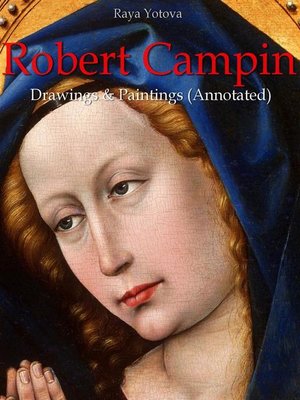
Sign up to save your library
With an OverDrive account, you can save your favorite libraries for at-a-glance information about availability. Find out more about OverDrive accounts.
Find this title in Libby, the library reading app by OverDrive.



Search for a digital library with this title
Title found at these libraries:
| Library Name | Distance |
|---|---|
| Loading... |
This book with Foreword written by Raya Yotova contains reproductions of drawings and paintings by Robert Campin.
Robert Campin (1375 –1444), recognized with the Master of Flémalle or Master of the Merode Triptych, was the one of the supreme masters of Early Netherlandish art. He was very popular during his era, and as a result his life and work are comparatively fine recorded, but Campin usually did not sign his paintings. Three sacred boards, each supposed to be parts of triptychs, were from a monastery in Flémalle.
He was a master painter in Tournai and became the most important artist for three decades for that town, nowadays in Belgium. Campin had achieved Netherlandish residency, and may have learned from Jan van Eyck. His prominence had increase sufficient that he led a advantageous own studio and kept his status and studio until his death. His premature paintings demonstrates the authority of the Gothic style of the Limbourg's and Broederlam, but they show an extra realism, which he accomplished throughout innovative methods in oil painting. Campin was famous in his epoch, and educated Rogier van der Weyden and Jacques Daret.
Robert Campin (1375 –1444), recognized with the Master of Flémalle or Master of the Merode Triptych, was the one of the supreme masters of Early Netherlandish art. He was very popular during his era, and as a result his life and work are comparatively fine recorded, but Campin usually did not sign his paintings. Three sacred boards, each supposed to be parts of triptychs, were from a monastery in Flémalle.
He was a master painter in Tournai and became the most important artist for three decades for that town, nowadays in Belgium. Campin had achieved Netherlandish residency, and may have learned from Jan van Eyck. His prominence had increase sufficient that he led a advantageous own studio and kept his status and studio until his death. His premature paintings demonstrates the authority of the Gothic style of the Limbourg's and Broederlam, but they show an extra realism, which he accomplished throughout innovative methods in oil painting. Campin was famous in his epoch, and educated Rogier van der Weyden and Jacques Daret.







